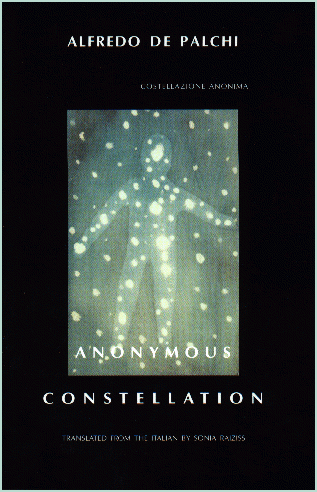
Alfredo de Palchi
Anonymous
Constellation
Translated from the Italian by
Sonia Raiziss
ISBN 1-879378-23-X (paper)
xiv, 96 pages, $15
ISBN 1-879378-24-8 (hard)
xiv, 96 pages, $23
Alfredo de Palchi is a highly regarded poet living in New
York. Writing in his native Italian, he has been translated into crisp and
vibrant English by his longtime friend, the late poetess Sonia Raiziss. She
once said of his work: "His words are instigated by the pure push of
an underground, undersea gush, rising to a shout or curse and then collapsing,
often abruptly." The celebrated poet James Dickey found that "Alfredo
de Palchi is both tough and imaginative. He is absolutely uncompromising,
and his poems are painful and exalting to read. One does not come away from
his stark and terrible and hilarious work un-touched." Len Roberts, another
noted poet, compares De Palchi with the masters: "Such precise, unadorned
poetic phrasings rank with the best of Lorca's and Radnoti's poems, and they
have the same strengths of personal, original poetic statement that many of
the contemporary Eastern Europeans presently being translated have.
De Palchi's first cycle of poems was
The Scorpion's Dark Dance, written in an Italian prison after World War
II, also published by Xenos. His second cycle was Sessions With My Analyst,
published in 1970 by October House (London) in translation by I .L. Salomon.
The third and most recent is Anonymous Constellation, again
translated by Raiziss. It covers his American experience from 1956 to 1980.
Professor Alessandro Vettori of the University of Virginia notes in the Introduction
that "While his previous poetic works
— The Scorpion's Dark Dance and
Sessions with My Analyst
— reflected on his wartime experience of
incarceration and its psychological aftermath, this new collection offers
a wider scope for thoughts on human existence in general." He sees them
as "an organic creation, to be read almost in a single breath."
Vettori further observes that "Anonymous Constellation
follows an evolutionary pattern: it starts with iconic reflections on primordial
cosmic life, proceeds to meditations on human history and ends with statements
about the poet himself. Evolution is thus both a theme and a structural element
of the collection." But with characteristic originality, De Palchi defies
the idea of evolutionary progress, asserting instead that "violence levels
all creatures and brings them back to their primeval state." The cycle
of poems thus presents a view of history turned upside down: history does
not instruct, does not help, but only repeats the great struggle, pitting
human beings against other human beings, human beings against animals, animals
against other animals. These are poems that stun and compel reflection:
Excerpt from Anonymous Constellation
I am
— here's the point
connecting idea —
watery grease insectivorous oil
sealed by eruptions
wells under the bottom, the ocean fat
with corpuscles, plankton
functioning with zeal for crustaceans
for fish serving other fish and so on
and so on according to size and the inexorable
food chain — tough predator, dry
fire of dorsal and pectoral fins
erect on pedicles or stilts
implying traces of limbs and the spine
a gristly tube: the coelacanth
not yet extinct.
HEAR Alfredo de Palchi on the Internet
Catalog | About Us | Links | Order info